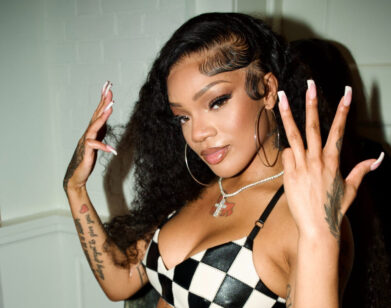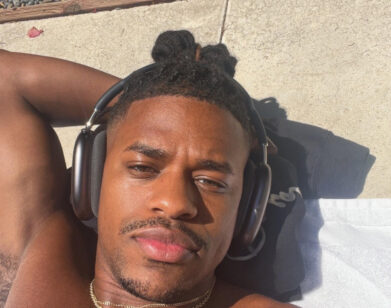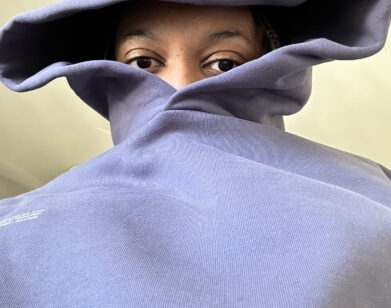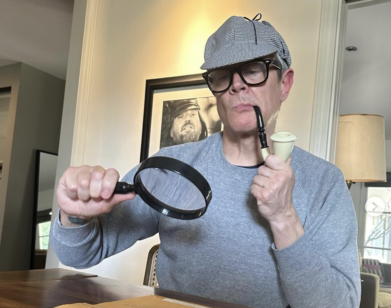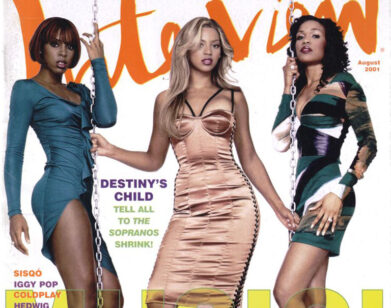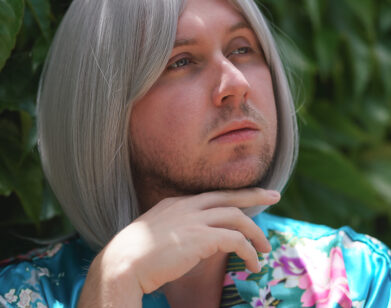in conversation
How RILEY and Angelica Ross are Living Their Lives On Purpose
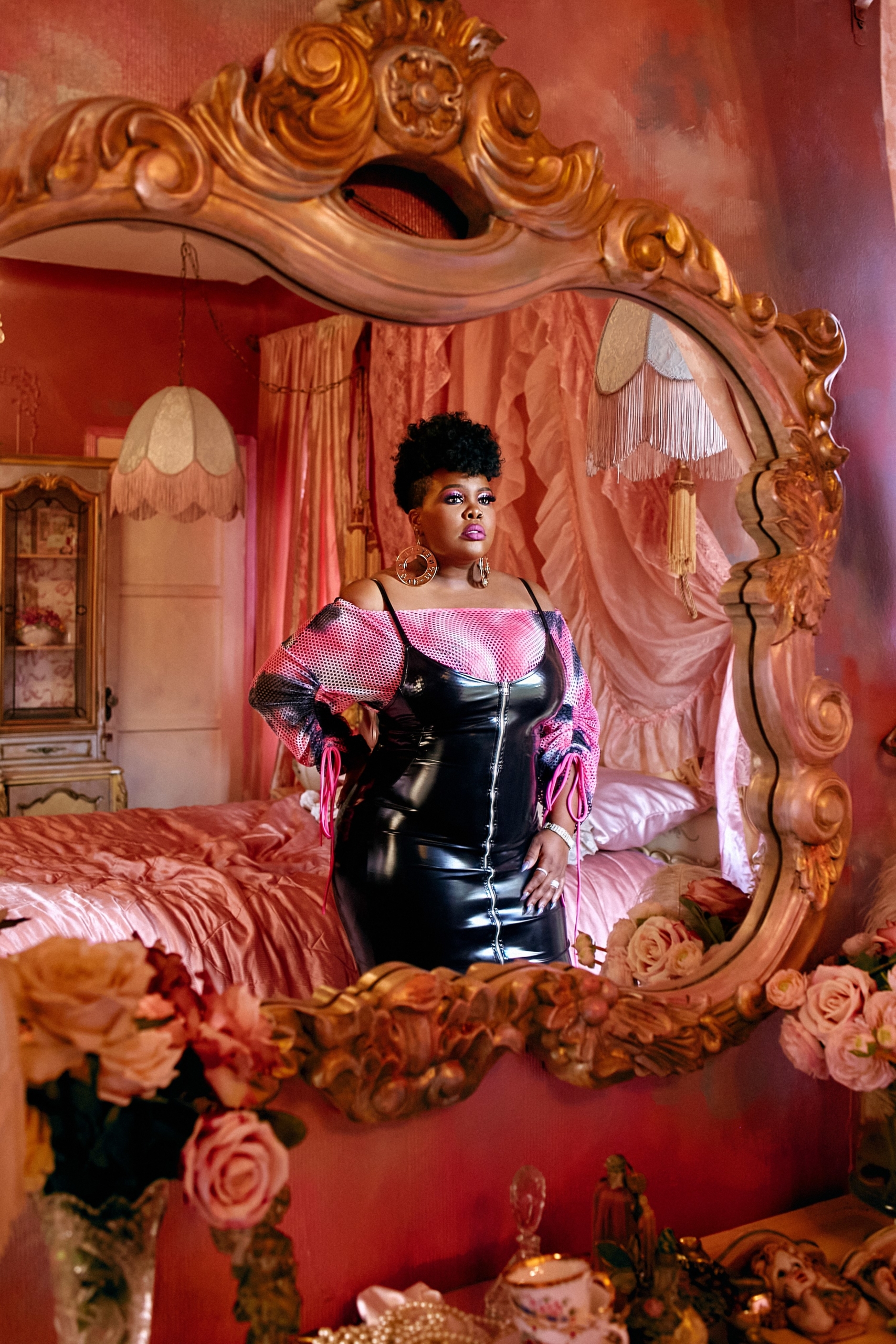
Amber Riley. Photo by Justin Frazier.
In 2009, Amber Riley began gracing our television screens as Mercedes Jones on Glee, for which she and the cast won a Screen Actors Guild Award for “Outstanding Performance by an Ensemble in a Comedy Series.” Since then, she’s accumulated a resume that every performer dreams of. From playing Effie White in the West End debut of Dreamgirls to Addaperle in The Wiz Live!, one might begin to wonder what else the supremely talented artist is capable of. The answer? Her recently released debut self-titled EP, RILEY. Donning the mononymous name that Amber Riley now goes by in the music world, the project includes songs like “BGE,” “Temporary,” and “A Moment,” which she performed as a tribute to her late friend and former co-star, Naya Rivera. Her music is raw and vulnerable, but as she tells the actor and activist Angelica Ross, a fellow member of the Ryan Murphy TV universe, she doesn’t know any other way to be. —JULIANA UKIOMOGBE
———
ANGELICA ROSS: Hey, RILEY, formerly known as Ms. Amber Riley. What’s going on?
AMBER RILEY: Hi! Good. How are you?
ROSS: I am so good. I am so excited! Listen, I’ve been looking forward to this. I have been playing your EP nonstop.
RILEY: Thank you.
ROSS: I’m in the RILEY Glee Club, you know what I’m saying? I’m taking lessons from you! As a matter of fact, to even clarify right now, in case anyone else did not know, you were the greatest talent on Glee. You had the best voice. I was just like, “I need to hear more from my sis. Where’s her next song?”
RILEY: Aw, you’re too kind.
ROSS: It’s not about being too nice because I know from playing Candy [on Pose] in Ryan Murphy’s world, we stick out no matter what the scripts say.
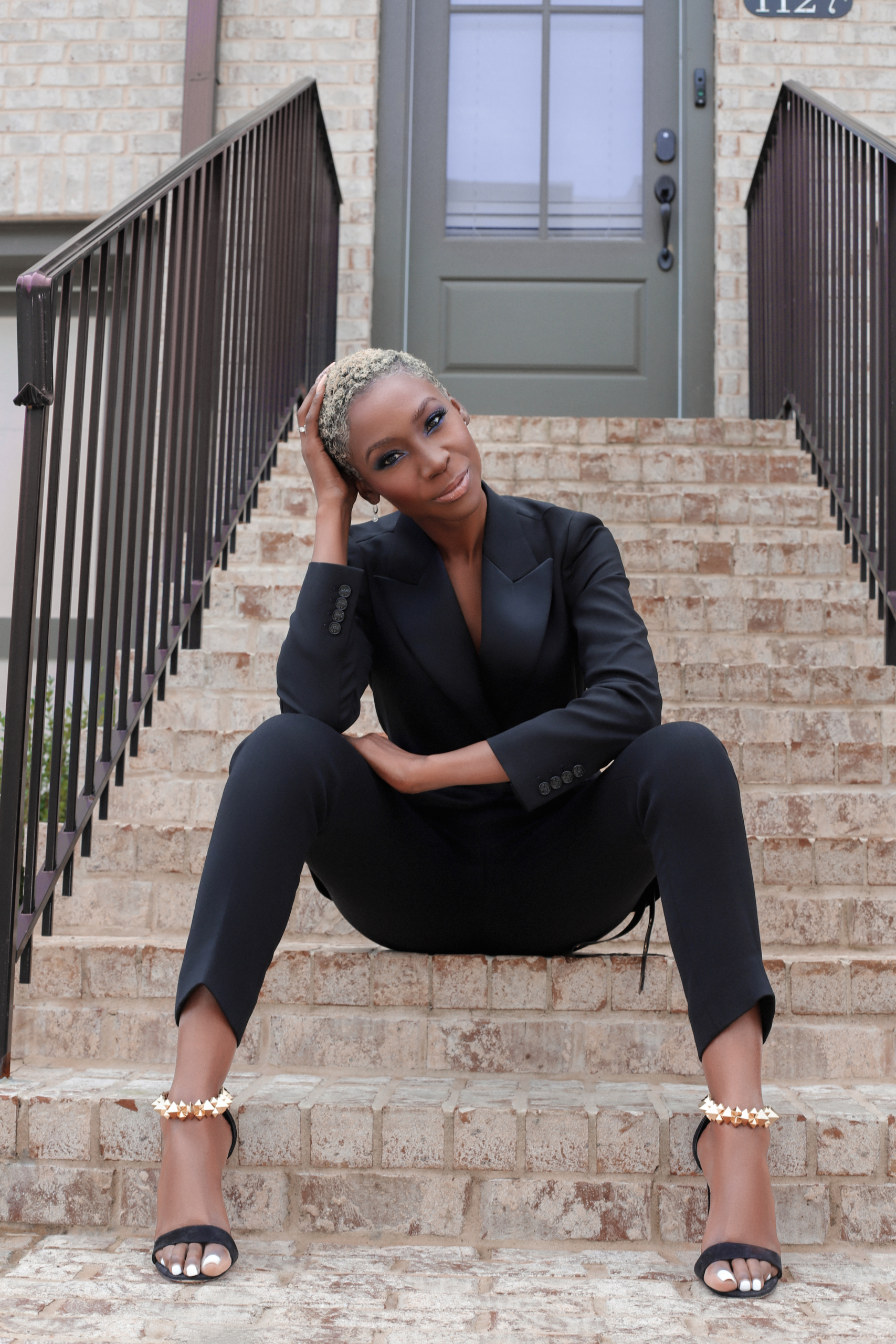
Angelica Ross. Photo by Malik Amir.
RILEY: Period.
ROSS: Do you go by “RILEY” for the music and “Amber Riley” in acting?
RILEY: In the acting world and branding-wise, I still go by “Amber Riley.” For music, I’ve just been going by “RILEY.” I don’t know. I haven’t figured it out.
ROSS: Where did that decision come from?
RILEY: Honestly, it was me having a conversation with my manager when we were putting the whole look together. The sound was done, the music was done, and now we wanted to create the persona. She was like, “One way that we can make a difference between what you do in acting and what you feel like people are going to expect, is to do a change of the name.” So it’s kind of like “Sasha Fierce,” except it’s actually my name.
ROSS: I got that immediately. Do you understand that the only thing that I aspire to now is “BGE?” Big Girl Energy. I went crazy when you dropped it. Listen, when I tell you that I was getting krunk off the first listen… Then when I saw the energy of the video, I was starting to rationalize how I fit into this, and then I had an “ah-ha” moment. I was about to put my big girl panties on.
RILEY: That’s literally what the song and the feeling are about. It’s about being a boss, putting your big girl panties on no matter what it is that you have to deal with, and just getting it done. Honestly, when we decided to do the visual, it was important to me that the visual elevated the song, and I think that it did just that.
ROSS: It did! You don’t even know. I’ve never been so jealous in my life because I wanted to be in the video!
RILEY: I really wish that you were here so that you could have been in it.
ROSS: We see ourselves so many times in other people’s art, and I can’t tell you enough how much I’ve seen myself as you’re talking—from “BGE” to “Temporary.” As a Black trans woman, I have these dudes that try to offer me a lot of temporary love. But now, I’m paying my bills and I’m doing me. You come and go as I want you to come and go. There’s no sweat off my back.
RILEY: I am so happy to hear you say that. Not happy that it’s happened, but happy that that’s what you got from the song. When I wrote “Big Girl Energy,” that’s exactly what I was going through in the dating world. You think because I’m a big girl, that I’m just supposed to take what you can give me? You think just because you’re giving me a little attention that I’m just going to take whatever shit you decide? No. That’s not what this is. That’s why I say in the song, “You thought that tears would flow, and you’d watch me while I’m asleep. Let it go, that’s life.” I’m not crying over you leaving. Get the fuck out!
ROSS: Yes! I want to talk about “Ride” because it has such a whimsical feel. When I listen to that song, I feel the same way I did when I listened to Beyoncé’s “XO.” There’s the theme of escaping and enjoying the moment. I saw a video of you talking about how you wrote this song with the understanding of all the things that Black men are going through and giving them a chance to kick back and ride. What was behind that song?
RILEY: I was very deliberate about my intention when I was writing it. I was talking to my homeboy that day and he had just gotten his car fixed after saving a lot of money. He went and got his car, paid for it, drove it right off of the lot, and the car broke down. When I called him, he was with his daughter and I could tell how upset he was, but he couldn’t really get into it. It started to remind me of my dad when we were younger. He didn’t really have those outlets or anyone to talk to because nobody has made it okay for Black men to express themselves and to be vulnerable with one another. Then I thought about how there’s not really any R&B songs that show that kind of vulnerability and love to the Black man since Angie Stone’s “Brotha.” It just inspired me, and I really wanted to express that—“I got your back.” The Black men in my life show up for me in such amazing ways. I know we could point out the negatives in our community that have to do with Black men and women because those exist also, but I want to take the time to acknowledge the ones that are doing what they have to do for their community, instead of always doing the opposite.
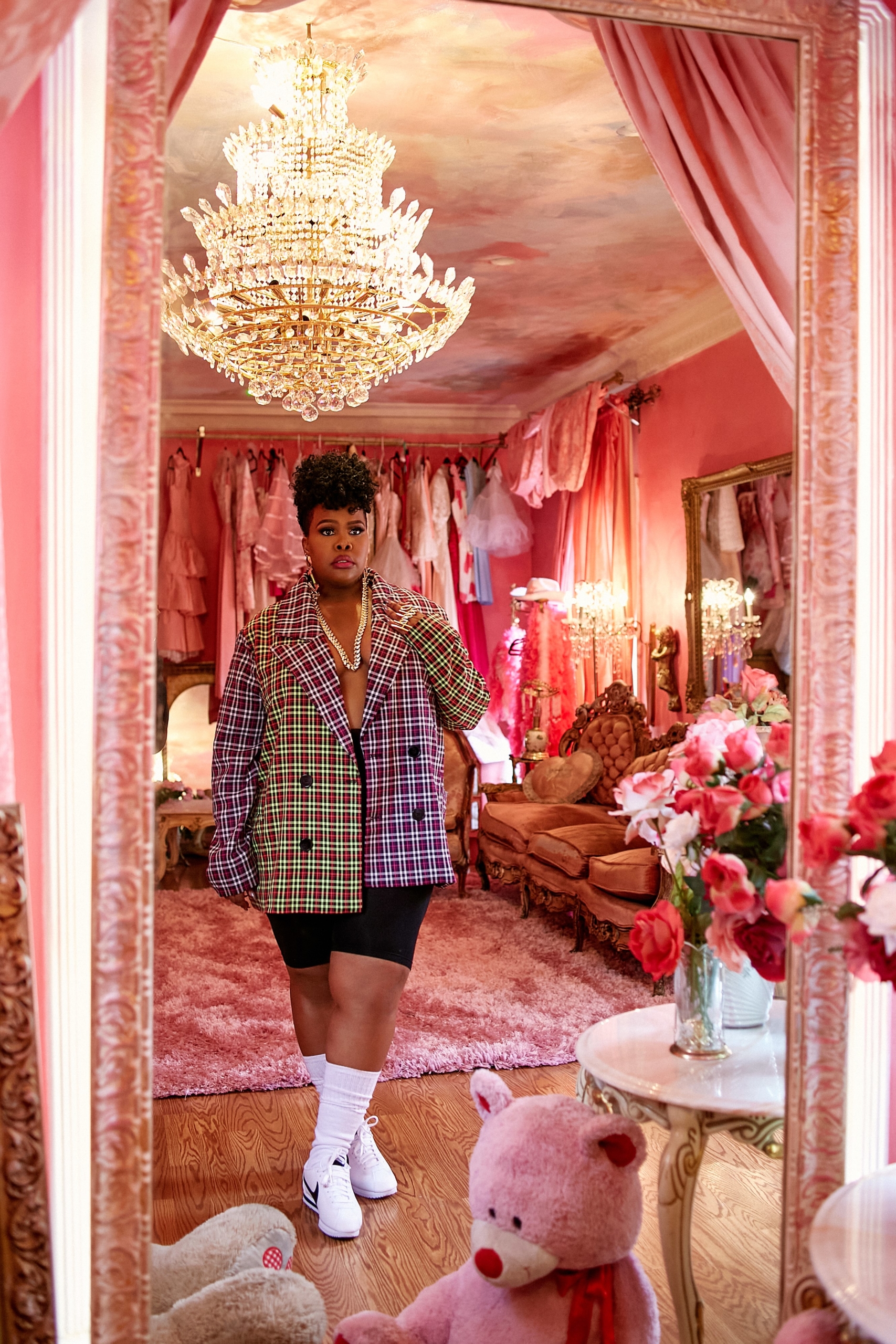
Photo by Justin Frazier.
ROSS: Well, Amber— I’m going to go back and forth between Amber and RILEY because they both pop to me—but, when I was listening to “Ride,” there were so many times that I wanted to cry because the same thing that you just said about Black men, I’ve felt that same support from you for LGBTQ people and for trans people. I was listening to the words, “I know it’s hard on you. This world ain’t always for you. I know what you’re going through. I know it’s hard. You carry most of the weight. I want to give and not take. I know it’s hard on you.” It made me feel like, yeah, Amber, pick me up, girl. I need to just take a ride for a second with you. Let you drive. So, just know that the art is translating.
RILEY: My heart is in my activism journey and becoming an advocate for all people. I did talk to some of my trans girlfriends during this process. We were talking about dating and love, and how similar it is for me being a plus-sized Black woman and they being trans women; it’s about feeling hidden. People hide us.
ROSS: Have you seen a play called Fat Pig?
RILEY: No.
ROSS: It’s a play by Neil LaBute. I’ve been wanting to redo this play because it’s brilliant. This man falls for this big girl and everything is great, but then he starts hiding their relationship. I could change not a single word of the play, turn the character trans, and it would still hit. There’s this idea that we should accept whatever we’re being offered when in reality, we’re the prize. When it comes down to it—especially when folks like yourself, myself, Laverne [Cox], or any of us—turn on that oomph that says, “I know my value, I know what I got,” it completely makes whatever they’re trying to offer you irrelevant. I love the way that your music is really bringing folks together. I just want to know, why now? Why’d you have us waiting this long, girl?
RILEY: I had to go through what I went through, and I had to grow to get to this place. I don’t think I knew myself. Hollywood can do that to you. I started in Hollywood during my developmental years as an adult. I was 20 years old when I booked Glee. I didn’t have a normal young adult experience. I always needed to be guarded and I didn’t really know myself until all of that went away. I really had to sit in the quiet and in the silence, much like what a lot of people have had to do during quarantine. We’re now stuck with our thoughts and we can’t distract ourselves with the normal things that we do every day. I had to really get to know myself, and the one thing about music, you bear your soul in order for it to work.
ROSS: Absolutely.
RILEY: Music is the only thing that doesn’t need permission to come into your brain. That is how effective it is. Scientifically, you could be singing a song, but you didn’t even know that you knew because it doesn’t need permission. There is this sensitivity to music, and I knew that I could not go into a studio and connect with my audience if I wasn’t connected to myself.
ROSS: Speaking of that, what does self-care look like for you, especially as an artist? For me, I play the piano and guitar. I’m really happy with playing instruments as my therapy. I sit down at the piano and I may play for 30 minutes and look up and I’m breathing differently. But when your art is also your job, how do you create that space for self-care so that you’re not putting the pressure on your art to be something in certain timeframe and on a deadline?
RILEY: That’s an awesome question. For me, self-care is self-first. As far as dealing with depression and anxiety, I have learned that I have to come first. I have learned that it is okay to piss people off because of a “no.” If I need to take a mental day and not talk to anybody and not be productive, that’s what the fuck I’m going to do. It has to be me before anything else. It has to be me before a check.
ROSS: Absolutely! What replenishes Amber? What does that look like?
RILEY: I like being outside and being in the sun. I like watching a really funny, stupid movie that I don’t have to think about. I love self-help books or books that talk about spirituality.
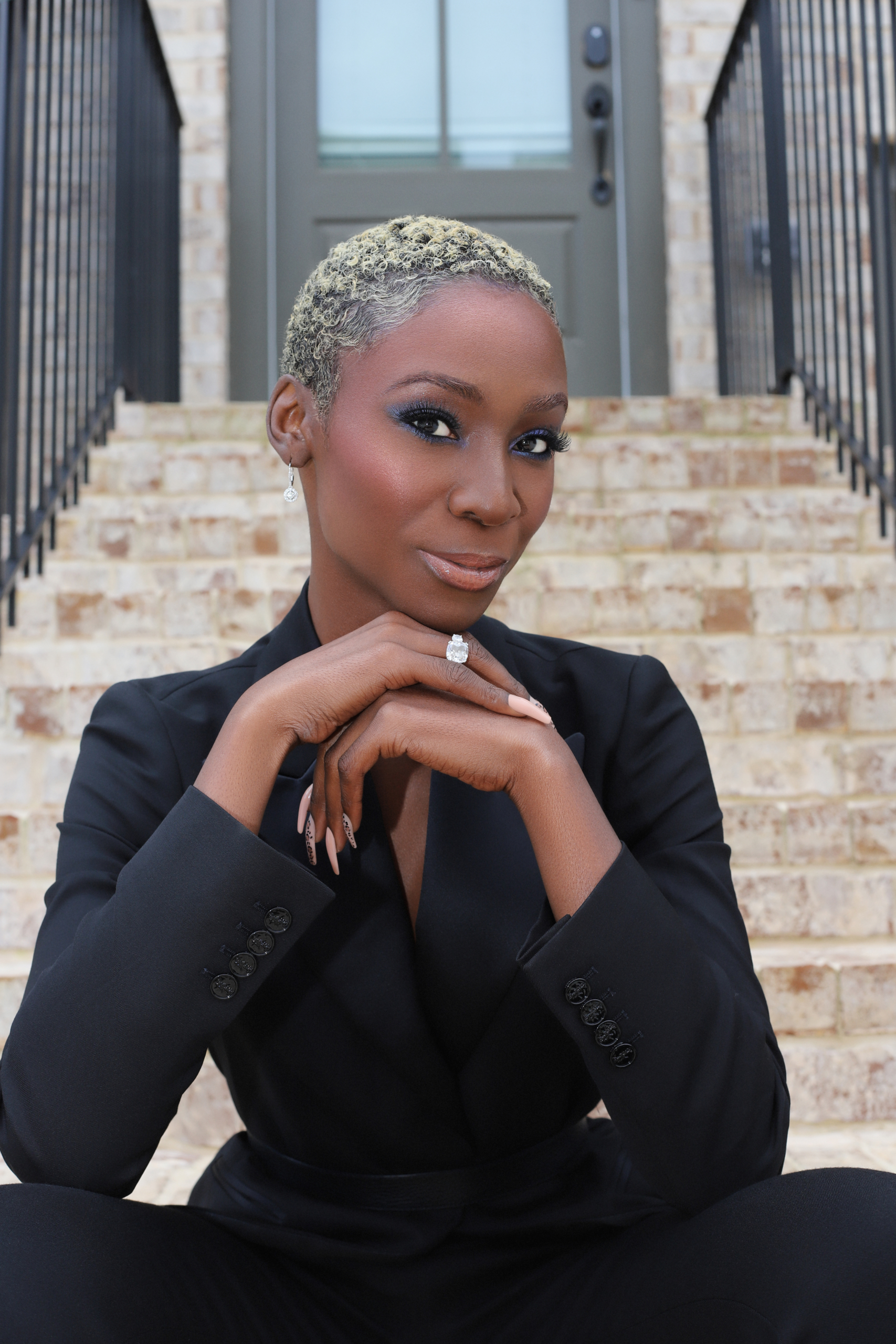
Photo by Malik Amir.
ROSS: Do you have a favorite?
RILEY: Right now it’s Crushing by T.D. Jakes. That book is really amazing. I’ve already read it twice.
ROSS: He’s actually the reason why my email signature says, “On Purpose, Angelica Ross.” I remember seeing him speak about living your life on purpose and it changed my whole perspective. I want to also talk about “A Moment.” First of all, let me ask you, do you feel comfortable talking in this space about Naya [Rivera] and the song?
RILEY: I’m okay talking about it.
ROSS: You know when you feel a pit in your stomach sink? It felt like the whole world did that at the same time. A lot of times when certain things happen, I don’t have the words. When and how did the words finally come to you to be able to talk about it, let alone sing about it? We feel your heart in that song.
RILEY: That’s the last song that I wrote on my EP. I cried the whole entire session. At the end of last year, I went through the worst bout of depression and anxiety that I’ve ever gone through in my entire life. In the process of doing the EP, I knew that I was going to have to write about that, but I knew that I needed to be in a better space because what I didn’t want was this heavy, depressing song. Little did I know, the song was going to be more healing than it was going to be heavy. I never intended for that song to be out first, but Rel [Lil Rel Howery], who was actually hosting [on Jimmy Kimmel Live!] that night, asked me to sing a tribute to Naya.
I said, “Before I say yes, let me get permission from her mom.” I wanted to be sure that anything that we were doing in her name, her family was okay with it. My whole thinking was that if we were on Glee, we definitely would have done a tribute, and she deserved that. She deserved that moment. She deserved that memorial. I sent her mom the song and she was in tears. I told her, “I’m going to put pictures in the back. Can I get your approval of some pictures I found on the internet?” She said, “Oh, girl. I got pictures.” So she sent me family photos to put up in the background. It was a healing moment. The cast [of Glee] called me after seeing it and were like, “Thank you so much for doing what we wanted to happen.” I feel like that was a gift from Naya. I feel her all around me all the time, and it took me a long time to come to terms that she’s not here anymore. Some days I’m just in disbelief that she’s not here.
ROSS: Thank you, again, for being the artist that you are because that is what makes the world go around. Do you ever feel overlooked as a Black woman? Your range, your control, your soulfulness… it’s incredible, but I know that voice coming out of a white girl has tended to have a different response from the world. I’m going to speak for myself, and I’ll say that it has been a journey being a dark-skinned trans woman in this space where folks want to talk about diversity, and sometimes even though you’re in the room, they still don’t see you. They still don’t see everything that you’re bringing. Have you felt that also?
RILEY: Absolutely. Some people think that being Black, being a woman, and being plus-sized is a handicap. You can only do so much and you can only push so far because the world doesn’t accept you, and the only way for us to change those norms is to push against them, and to be loud and to not cower. That’s why I love you so much. I love people like you, who say, “I am intelligent, I am Black, I am talented, I am brilliant, and I’m not going to be quiet or apologetic about any of those things.” I strive to be that way.

